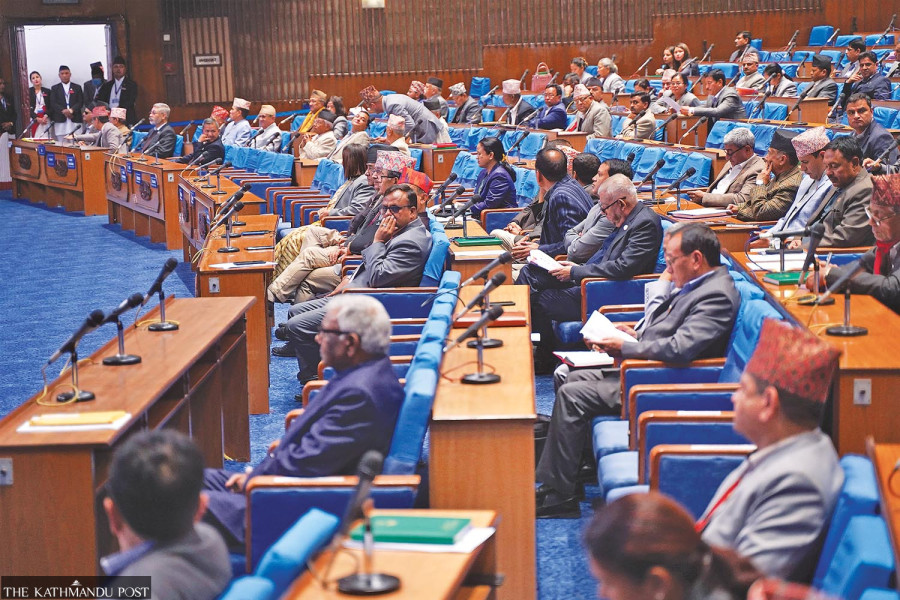Politics
First session of House ended without passing a bill
Previous legislature got embroiled in a dispute over twin dissolutions. This hung parliament bears no bright prospects either.
Binod Ghimire
Two dissolutions, frequent disruptions and the reluctance of the government in providing business left over half the tenure of the previous House of Representatives largely fruitless. The five-year term of the first House elected after the promulgation of the Constitution of Nepal ended even without endorsing some of the crucial bills needed for a full fledged implementation of federalism.
Given the way the first session of the House elected from the November 20 polls has gone by, it appears the current legislature could suffer the same fate as the previous one in terms of effectiveness. The House session that commenced on January 8 was prorogued on Friday midnight.
Voting on the confidence motion twice, election of the Speaker and deputy Speaker, endorsement of its regulation and formation of the House committees, which are mainly routine jobs, were done in 110 days of the session. The 28 meetings held in the span of nearly four months were largely limited to allowing lawmakers to put forth their views in emergency time, special time and zero hour. It couldn’t endorse a single bill.
“The performance of the first session of the new House is depressing. It seems it is not going to be better than the previous House,” Madhav Poudel, a former minister for law, justice and parliamentary affairs and chairperson of Nepal Law Commission, told the Post.
Though the previous House elected in 2017 was by and large effective for the first two years and endorsed numerous bills, it was mostly defunct in the second half of its tenure. It faced dissolutions twice—on December 20, 2020 and May 21, 2021—by then-prime minister KP Sharma Oli.
The first dissolution was overturned on February 23, 2021, which meant a loss of around two months. The second dissolution was overturned on July 12, 2021, which caused a loss of another two months of the legislature.
While restoring the House on July 12, the Supreme Court also ousted Oli from office and appointed Nepali Congress’ Sher Bahadur Deuba the prime minister. The House was expected to pick up momentum, but starting September 8 last year, the main opposition CPN-UML resorted to obstructions to protest against Speaker Agni Sapkota’s refusal to take cognisance of the party’s decision to expel 14 of its lawmakers.
The UML’s disruption continued for months. As a result, the lawmaking and oversight roles of Parliament were affected. Even when the obstruction was lifted, it didn’t become effective because the Deuba government failed to give it business. Nor did it make serious efforts to resolve the disputes in some of the bills for their endorsement.
As a result, close to two dozen bills, including on Federal Civil Service and Citizenship, were left null and void with the tenure of the House coming to an end. “Making and unmaking governments is just one of the several tasks of the House. However, it has been the House’s entire focus,” said Poudel.
He blames the government’s failure to provide bills, inadequate coordination efforts by the Speaker and below the mark performance of the main opposition for the House’s poor show in its first session. The incumbent Pushpa Kamal Dahal government registered hardly three bills in the House. Bills to amend the Enforced Disappearances Enquiry, Truth and Reconciliation Commission Act, the Constitutional Council Act and the anti-money laundering Act were presented to the House but none got through.
“Holding the government accountable is the primary job of the main opposition. However, the UML has failed to perform its job effectively,” said Poudel. Until February, the UML was a part of the ruling alliance. With the CPN (Maoist Centre) siding with the Congress in the presidential elections, the UML recalled its ministers from the Cabinet and took the opposition bench.
Gopal Nath Yogi, who retired as a secretary of the House of Representatives on Friday, agrees that the performance could have been better. “However, we cannot say nothing has been done because the election of the Speaker and deputy Speaker, deciding the vote of confidence, and endorsing regulations are the major jobs the first session needs to accomplish,” he told the Post.
Learning from this experience, the House can function effectively in the rest of its tenure, Yogi added.




 10.12°C Kathmandu
10.12°C Kathmandu















